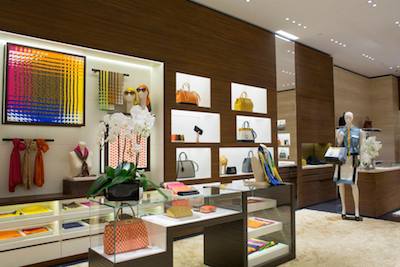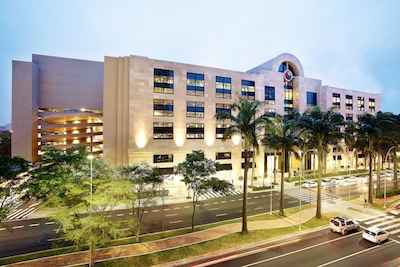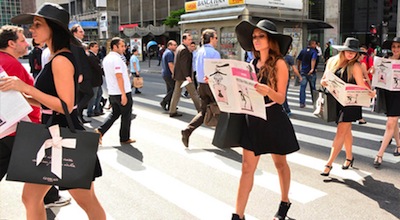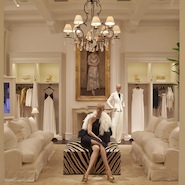The entire world is currently faced with an uncertain economy, but Brazil has been hit especially hard in recent years, according to a new report by Boston Consulting Group.
Brazilian consumers, still seen as a promising growth market for luxury brands, are feeling more anxious about the future and are taking steps to cut back on consumption. Predicting the impact and duration of a stilted economy is difficult, leaving brands in a tough position as they consider whether to pull out or maintain a strong presence.
"There are a number of internal and external factors at play," said Silvia Sonneveld, partner and managing director of The Boston Consulting Group, Sao Paolo. "Decline of foreign investments due to U.S. interest hike and slowing demand for commodities; ultra-low approval rate for the current government, creating a political deadlock avoiding that necessary reforms are being implemented; rising budget deficit and rising interest rates limiting options to support growth through government investment.
"Over 50 percent of consumers are anxious about the future and adjusting their spend downward, which combined with rising unemployment and limited further growth of credit puts a firm break on private consumption growth," she said. "Whilst demand for commodities did have an impact, the recent devaluation of the real actually helps to drive a positive trade-balance over the last year, but in all was not sufficient to compensate on other GDP building blocks.
"The additional consumption will not be enough to compensate. Furthermore, once the works on the Olympics-infrastructure ends this might have a further negative impact on unemployment."
In recession
Of the 2,000 Brazilians surveyed, 51 percent say they are anxious about the future, a marked increase from 2014 and 2012, when BCG found rates of 39 percent and 30 percent, respectively. Consequently, two-thirds of consumers will be cutting back on spending in various sectors, particularly luxury goods and travel purchases, double the number who said they would do so in 2011.

Fendi boutique in Sao Paulo
Worse for the luxury industry, these rates are not especially dependent on income. Anxiety in the highest income level is at 46 percent, with the lowest only marginally higher at 7 percent.
Brazil’s growth has slowed since the start of the new decade, with a 3 percent contraction in GDP last year. Eighty percent of consumers say they believe Brazil is in an economic crisis, with 58 percent saying that it will remain so for more than three years.
Illustrating the crisis, debt is rising in the country. In 2014, one-third of respondents said 30 percent of their income goes to paying off debt, but now 43 percent of consumers do so, with debt often being a part of even routine expenses such as clothes and shoes.
With consumers going into debt for clothes and shoes, it is unlikely that they will be looking to spend big on the same items, even as a gift or to treat themselves. This is compounded by the devaluation of the Brazilian real, which has dropped from around one-third of a dollar to closer to a quarter of a dollar in the last year after hovering around the .60 cent mark at the decade’s start, forcing import and thus retail prices up.

Iguatemi mall in Sao Paulo
Despite the abundance of bad news, there is good news for those in the beauty space. Those who do plan to trade up are prioritizing personal care products for health reasons rather than indulgence, with 64 percent saying “healthier or better for you” is the top reason for trading up.
In 2011, 81 percent said they were trading up because “I deserve it,” 62 percent because “I can afford to” and 60 percent due to the brand name, compared to just 48 and 45 percent and 38 percent, respectively now.
With health as the top reason, brands may be able to establish support with entry-level products by presenting their products as a healthy necessity rather than purely as a luxury.
"Over a long period of years, we have observed in our trading-up/trading-down research that consumers tend to spend more on products and categories that they care about and less on categories they don't care about," Ms. Sonneveld said. "In this way it is normal for somebody to be buying a designer dress, but shopping in a discount supermarket. This trend is happening across markets, not only in Brazil, and is enabled by a broader offer on the one hand and more fluidity between social classes.
"On top of the long term trend that is still at play, people still have the need to indulge and reward themselves in times of crisis. The fact that this is very visible in the beauty and personal care sector is no surprise, and something long known as 'the lipstick effect': people still want to reward themselves with a luxury present, but instead of an expensive hand-bag they now buy a lipstick or other personal care item."
Brazil redux
Garnering support in a way that matches consumer reasoning could carry a brand through the eventual economic recovery. On the other hand, pulling out of the country or lessening marketing efforts runs the risk of losing consumer support and recognition, which may be difficult to recover after the recovery because of brands continuing to create desire in the interim years.

Guerlain built a strategic partnership with Sephora to distribute in Brazil
Regardless, almost all brands will need to consider making over their strategy in Brazil to adjust for the current and continuing recession. Pricing strategies, positioning and marketing messages that were effective when Brazil was growing quickly are now hopelessly out of step with the consumer mindset.
Retuning Brazil marketing could be as simple as a geographical issue.
While most brands concentrate their efforts on Brazil’s coastal cities, consumers residing in the country’s interior are projected to contribute more than 45 percent of the growth through 2020, according to a May 2015 report by Boston Consulting Group.
“Capturing Retail Growth in Brazil’s Rising Interior” explains that Brazilian consumers in general are tightening their spending compared with the past 15 years, but inland consumers go against the trend, and are anticipated to account for $60 billion in new purchases over the next five years. While sporadic demand within the population may not justify a wide retail presence, brands can use other strategies to reach these consumers (see story).
Despite the slowing growth, however, many big name brands are continuing their push in the market, hoping to garner the attention of the highest of high earners and create desire in potential future consumers.
In April, U.S. fashion label Ralph Lauren opened its first Brazilian flagship location in the city of Sāo Paulo.
The brand announced the store’s opening on its social media channels which are likely followed by native Brazilians or consumers who visit the country regularly due to Ralph Lauren’s global notoriety. Ralph Lauren’s latest store opening reinforces the brand’s efforts to increase its retail footprint internationally and in the Americas (see story).
"Brazil continues to be one of the largest global markets with enormous potential," Ms. Sonneveld said. "Whilst uncertain what scenario will unfold, the crisis is expected to have an impact of another 1-3 years.
"Knowing this, it is worthwhile for luxury brands to continue to connect and engage with their current loyal and potential future customers to cultivate this future potential."
{"ct":"TUH5GalJr0tBlfxhJD2XWKnTFedp3DixgMPOx4dRvDGd+TPrGdLUnZ\/QLQ3bnWJKayFYkkIogKjpvjBG2Jb+gWxk\/7JUzSfB3dEIbY\/31aQHr2ShkP\/8RYHoG2BFMD47KqG8mvVcAyPC8T4QHGSPWQHEU7Yuq3pB3+zvZi7ALKthMQOz2FnJhaBaRLec7fIOhWhVq6MoyMZhCrlerPEr2UE+EMAvIVHAa3kucdiPfjuzTG8lUQOJF+Xg5AQjcC0m9NILWw23KdcPSd+kzebWoYo29OisDzJ2xJ68\/3Fd1XPVMk2GYIsBrmxHxW\/73DEVbiXiOVGkTlHxbvkIV+cvLaP0RHcTbNlQbL5uRhnTol+nNdYaCXYf\/gOf7KV70a0+KPSFdvro9jDcZeoLP82JazerJpoEUhbVt\/+pnkC\/fERDBvmjXgQ8GfMlrySQyI914jdfDs5tIhB\/sZDUIJCQieWZ4DDWzcuDhKaTKHr6VAsRp+l71w4PgQvTemMWawcJ4b9\/5gnEZwB8Utyo36jGfaesAlndhF+uUixEqyzBavKzZ3VyFDxQ0ynHEnAIidVbhd\/8GuLX9VRAple2zMPu+xIwNqu4megv550icPwi7u8\/7PQN+w0PqALYEHtD+e\/SJgI5q54yIXrTKe03CpLAE1Q7Hs5rXq7dF4CFXB6xwN5vbe6kzELnkjVhTo7qvGU2yyDLVi5VkKD43gOMREwsGTQWfXAjcwjzXxE4PlOQlZV0cGTsBPt59C+lyB+2q5uIxpI9to8msrk\/qSh++FQpirrG\/n\/MxpAXJh8AcZHvGWNLHdwB3\/J0awM3\/MeelJj43fdkDA77PZzcFEBrgY3F7TCzYdTB4G4Lt0UrmOE1YoO9tNNo7xATfSf3N4kIO5NzvmvDQ0p8WDNbLZx0\/hlwAbLKN8\/hdz1ojZ\/AKmKZPy5Gnlfx9p2Jr+1Yc3mwasQqkUrjGNRgimQxUpM3ifFGlv8k\/Nqf\/W\/Z+1V6dTiks31cgFb9K7yw43\/zAwu\/Lbc9r3qta8qxRgDn7v4ZwI7Teg8O9jyZSJ+UiqPhl2qDfprgzdOkQcjclAI9+GWecwfRYSmApnqVXi\/i0g8dZ\/tN9fqBUvJP\/c5+gx8ZbKQJgK3Q9SqVGVNPG3SMSogjbPAxAMVn67T4epR4amtzRELd83M2KI9mj23KwmHnO6jgDXuYnAVybr5Jwn5xxpE5VHTPpOuhL0qVT0ZIBO86RPfg7DoBL0HCH9QwtG6yKmJ4+kSWTmyVSjEDz98Ys73O8eRrecCT3JZtxFDwbpklIrIy2DHaiSUFvOSL9fQjUR6Q6x7iTFcGtQdzlrQBWMQdPHvo5iE3H49kJqr4IuabHu7ezFaGgjsYtDy1eibWJdUqcbR+u8WCIbHSugmwhpklZc\/bYwY4+08JS1ge0jMVctHoTLH4wrCdnSk7W2CenFfJ3B1SYnb2+igbM+w8aSPKQGIoNsKyQB7XfODNHVGEP+DAFs2anbVeJnuJiF1aMNUQIlD0BBjp+fYSZj+q5QG8vfJpLRWg+PeLN7Cu0AvTSH+ByRyxMdBo9nyZSrLR3PQYnac9xNSjCH9SH9BaAtJLTDcv\/bu3VshwWo7mYkrGdfe6HFuIa4Rp0EdtrH1n89UZaRXj7duizKvfM5lh4cc\/HH6aQ\/MTuRy9XZ\/q1Y8kuwMr5lKFdBtCvv2eRYxWmS2TtIokEe9SrDdwSkKp2+CoHkhJ1lcdfGZgZaddksPnXmMi2pusSXvTRHl+tfTTePyyxOjsMniRfTgH0BxQsPo2nN423DJBOYLiLmCguMiX8ZzakmT1AWd5KfTV1Tz9he215hIZPTYr0gU+iPAw1DWa1Rtcg1YRPw8nqNGE\/ypQRiaH1Zzar0EjETYjMUqcrXcdHlgqa3tR1VKXPKil9Caf2uUd0z0cYHYXdPbDiWgDH1hCdrYBpUyn4Nvj7\/DWDfeIOoK00UPmaEg+M3g49A\/QeKtK7OuhAe7q7YEZ6xFdb7AbHnI\/fE484QFfTrLiX592\/dpDdblYRWkQIztKdgmpO51taPZH50ecWB1CJTJaLKATwY\/42ExRRIYIJWyBXB\/UYMmf0RXPnUEkEZ226MfPpNRLRTAyi5ya5eDNEUtRzFD84zQ9kjMbwcOt2i4Bo1wtW2j\/kfQ\/i9BsVrYm7gYrF6tfMhyP0\/Fw1Dne+sRws2T3FgKVgHpfWpRpwAMT2Bo78OfO3XglwfjSjA4owBSs9F4txGXdkGEorvpguhCEXLqAXytf5VOZhEVphCVZ\/e3WxcJttKgKR2LdutVxCZVN9TQIXgTs6XpL5Zp1SIkfT3XX\/Ex72Ya7+Nz6i44Ra3xwXyYHJXGSD+qaPofGB7Kce2+8sHStMqc8IdXsVLXPEMOeZ0frPN7kSf4PwsxVVaKNN2OXr9FRb5hirNnj1acApbjjom\/6Uf4\/D5p2BzjPaEsCpEbk4yfUsFCdQGIHYag7xaSHeyBr0Qo\/oCIfRd7PfgCRfvE0b8a9njjPAkiJ3ru\/jnDrsteCFVka8yMe8OVOD23BU5\/SGIxVmJ8ForP2UkbxHjoFYP99z8sQ\/MD9Hc96LuzOilZ4taW1uFrVfGudpoDDrrxaqghF8P5L7GVNMvyIccVYhOZLv3Gjk3tGQmR+2vQzuVVx+jWmxc9wbzkSjhD9muvBDI6JEptlgCIE3Fhl2vNYLeV1YQVclfOpa0xR6jNB7z5\/s+NSzuIvza3xSciI3G89sOuXfcOos4e2KJgP6HDtfnUDPJ2psEPu6L2+ZP7\/l7E7jpu7\/zm5p4GyJT2B94LDQg89FtLQF2jdWVXagnxIZYArJnF9iT2J9cGbdr0yt0J0n4v+kAGVChcKJha\/pQ2FAqyVdRbGhpNHrO9mJ9WiDaNHiwIQq4Q\/xhL46PYf81TbhtElk5sSh+2H\/RL17fdVbFswSzHlFr\/mywcfr7nJybwWiIAZ2ro8RmlLwV8kHRBq9QaCMsOh5MGTUKyUu+Y6ziFaHwuGbMYh62xqs9x9dbPr+P+RVjsj0lFYSJ9Ujqjro1EBzxrgiv\/BSI6Z6\/XQFSxdQAzneDd4q+qF0YO4cUH5ny5YaHzX1dmpAyw+k0FzfjDIfuoq\/gzZ6hge0o0\/8hEieRKj1ghv77LbqplTIUGDBc5cgxEEq6kmNm\/Qw\/j7YHQM1uwgkSwKIrGfPM0rvdQurqIUrQEg6R3sbrVCteHz2WsXkYFRqbRBpBcSHbv0ignT8qz0BzzqeBUePdJWLAvQzramnZJoOX2ptaMtmXgUQaoyr2ckrjFUy62gcDv+fpQdgIMZWqnGSbxEB\/GpS4I358rp+IQQqnf7ERXvb\/E2QvjySrsxoKXWiBXQ6d2EtOzjGUdyuClOzKY7o7O0Hat3fHsCkIv49JXmWh0DUqzp\/a6FSy32xAmif+YoAsFs45j0I+9CxTxSAVTZfNwi4F6bKc7vYIGxX+809bUz\/BqLRjM93G1G7zZ4239Tld5hPQy3yqw6wvXBm34ox+OXu\/LWEoqK8Jb2Cj6ByvOVe6Z1iWZGTIoyBw645B8X+dTiVTQ32ZPEeoacCokRr8PVxc9bKJsxzwLe9H\/mbo6xWVLknlT2dIRfkGBFM2PCe5vjchiAGFEi+UCw7J\/brgmJSMWXjUNN1TseA6bL5TUJ9tGnjWYfOBBRJ+ayFfRWwP7fJIoSMqP9QJLYWGn37xLIU0lWS2mdGggz1nHPwXOus72WxEfz4fxu8R2GlDZ74MUn8bTpvbi1KC9D5GkcUFgs9ncDcSRIo8f0Ve7awhVQNGAePheYXIJtMnSb16+H5xqD9ykHodwBYqN1OoCwrjPLk0HGJ0EwyIXX6AlL144pbQfM0kNrdFO2bI\/93VxkaDjHtO6A4Q6BJKYoEr4V0IwhvwUGhKOZViIVfWp29eBGtZhhYHtFKVaKXqsGvw66WB260Ngc78LU9OK0W4R2Qe9hIzL\/3L6ZHTh7hQNywUUzjmqPZarwg+7sFN8pTNDSsROJg4OBalQ1Evh9aS+duqwiujkxB2wUfEVMf\/neBnby\/Swuo17K9NHbWwuOSKVpgqqNrmKm5FGwO2XKG5cFZWVv4XwoyqpiPSeJicLoePLkOe\/QtHnsBQphD6trtYOtJKYO8umdqwXJ\/ml4aOIRP5+2UYWQQ8Q\/JEqoaSY8gpx9GqJ781P0JzEwbyQpqZS5\/99xXySm5wcue9aQNE42AOsnDZMyuU0u8BKdzGlLURu8kvbvV\/Fz9wg3cQjBGGEAHNZJeFWaEJ73xwFhBsv2aY+68\/AJSdMPX8x5lg1RWfwn4Vmgaas7DMOYf61FjS9ja7ADHgE2rJy3I\/ZkjcwIZ1jhp+Mj3brEMRvkH0hB8FBR9snYzUZBCWq2UE1bp1QzpO6cNzqrrgJsVA\/UWPZR5YOmdjvU4bTvmp637DLEVE5QmpjX2G746yn9aFiFvF7MAt8mEL+kxgZj\/9n1rybYpxfBdZ2tZJGEA1t9UaZbDrSUG2s49kZ5MxnMbvn3QC4841Vq3+vX8MKiGMyv0JAICcyvgJqkUIkkDDhqkIvnafDSvotMPVqYo05\/ecs7otTexefrJJW69CYMi\/zKXOpO79eN22C3KQVA7ZUg7jg8CWDn6aAzfdBFwhfLCXIfvzjylIN4P6dSvhWIKiuuFkG8s695ROqAXZsAX2ew+o\/\/m92hYsqdaCw3x45WeZsNXnBFIB22h\/slTccleop75\/TXz1ptyBKapchW9OfNN3rFDJmEdI409YHxiCv7PBrW6L6ang5k3MAckPzA6fwhVrkz8gCsp0KisaeUrOF01k54qMS2W8rv1l2gp791Hxc6ok\/gakgmnNPxzQabPADBOon5T\/4Y4aMxOgljgRI+qVT+ryGWlPUr2V4BNgdlo5g0OUgMRfxITnF+io3Vhqt44rBV4Q+gWsHONn0JaqFpjU3Gq2NBupgNzQzhHY8xRBuc2sfhKtCVv60BD2l\/7ZwHP5ZzV3fyMm7Bfr7SJZmvTp4EKs8af8S\/LpSyWvqbThvp8qGSGs4IQkxsozTpIcJq6IrJNSqmVAexeYjEa8rfcWLCcngJoiYYonflf0Bezd+i2l3m9dlpmp\/pnb246ZGKlIz8wuZislldcozz4UAiEwt1ZKm+ajJpj7zjyhECLZhAmmBiY6QqM7z0MhBSH7rfoL\/YTh31oKPSOJRDBKXJfYDhrkaj0kYR6aMNS3Pzmxb7sAf9YE3HbfZc3UrGfF4yQqQFNBzAL1rLq18trFz8ZibrOhAECcjDkp7mb488CHI4MAO9GccNkGMUUFRBDROfpMHjADwztzHIiN3A3fQETLC9vOhiwaLmQ4BdxjX8CU0I1uOgVK4pnQHnEoTN4UHe4TyXtsmB2qXx76o7BipvvsaeySzoKBgxYe6FmFt6hiDsUCw90beHi2\/0n8beV+J7Hp01Vx4w\/\/awLMtBKpMERNfvkeIvz\/LxWuH2Nq4pQLDQh0z3fPSovNXe\/pbZgEwBEV07NbRv360+dntRIjoaHoRAsmXsIUwuDZJNxegsVcQwswE6sX7T7Fw5g8LbZWm1ZW+8PJBenSMXdq\/uUXJ333WqViYi3nqAnV11Jit3BU4zsChFaX\/UUflKmqCYDwn50uyFrKnwhhfSUyN33tWfI40GerZeEbQcbExGqthi90VamsxnCIzOB4zOq7gcO0GvvNHitqEeR+AscJ5eMpr6bKNAaAcd\/f5GWoM2QjAIFRqXE0mLIPhdNjt2DkyEcJTPh5GAc\/ZqOPFiIlKL8dvNeSKC69YEh3XdsdLyp8+LWLCDEUAGPG1CgidLM8xeVnzGYjUtD6x\/HqQZRaD0enL6cUfZb\/vSDrZtieyEhEi1a7PAX06SDt8Ocoufb3g3rj4O2Z0svsBFicwSQMy7skFYBDkA8dk+g8HpajjGI4NVxU0JHCI5oq0wGlGgTiZDNz0P\/xugZegs\/QTy+HYJJFmgO8Ru0LdSGSpNEIgHMN5h3VnQjv\/+k1sEwwfkXSMQwuzHZQCuTY6j8n9FFE\/htvm+9J4T1t6I1i6Nglwx4eTetNcr52bWcApLkLhwpzfSPkQTsiBOgLYvPxmk0ij\/2+GTNr1sMm4mQ1qoZrBmpws5en3n64q7zWAAgqTyOfFPAPa6420SUxSzkVydc+OZBfjwgDd7v9eB2MGnv5WS9MUM9\/k9YpTP4toFJbqxnCJPnANXSOcjTSXklcYkbETBFJxbe7Eox5nl50xGCuWfOSM0iyz0htQfmpFUyvnur+8pYAqeiCdVAXkIEyRT9rVZLJ0z16E6arf4VwyvN2BQ9BWOisw0A1nb8qmhCUNoPphw\/bMHG5DqqgmEJcIdD\/Ifr2gXtc4Nc0ev7Li6okaYlmSQ5j+iNDKxsYx8Yz\/t1mkudT8kfmbMfDV40RFDPqn3wkpMd81RK4y2dx1e1\/ZJFfEP\/siMvOFde7fB2Dcz8\/rOO4DCedkzUueIsDi\/nH6kK5H0CPA76viMR5DJ5+RrFP2p2GDAZok0RyuKt\/6Kw6T8MNSLqIxa4hOif09jOdxepLWfepAdmqII9Brb5Lquy9aL+7GLwsoxU0tKK4XDfkP3w60R3Q2ChIhA7Cuxqis+6XffRkE5ufANqDHONyNZYQiWX+5vqfck+3Xul6cO4XaMJguRFFmN8OyM7P1SRWvDkmBo4RoHpxx18J+QaY8waMcrLX94eQaKzjCyIPFFHAd0zeJ9C9oQdlwtwtrNJ6MxG1l\/FyQ2MvljvxDfiYu5B+waWe9AztH5KAj0sAC3lFm+RuAqGB2rZ6kAw+pqOr7dRtMr5dOF\/R+Z4KukS6tQQZH5Uk7RN8jNQJjHCf8Ry7hDl3vt+LeE\/vKM3HhTBFD6XURq2cm6qz96aX\/N6lL9yE73bofkj0bB47ioULIreUvccI30D+sGdTh882dtogpb5rS20Qm9LSWBaKbvR1jdMDrbLFi6uy4t7JnRqrxHG7eV3U8WtwDeVFd9Ggl5ODcNVm64IY6mpYeu9u+G9PIOZzVhBs1bgt5VdVGV8Dv01Rnhb3aowd\/0L2lncsOqTSqHFJ7nz1IeweKKbw0IDJv8ecp+1b0qHqdx1b5Fmf+Hf+8kDPdjRmQ9Uk4JS4mCnivBpt\/KCLn08y0LsDpAGQZdWQY4WiZsGWCiEt7g7SvJqLraHteVd1NhAFcuVRn0jo3KIIz65Oofr87YDbugomnHsBUHWYPS2i1Fkd+UHutAOcuneRjbgQud7nv3BaTMoRP+sLva6jnDQvta3GlwvabxsCrkkfW4Gb2YTLs5F2t\/t4PlgL9f5kgVAPHWWHONq++dYxnIyiQ31x\/vJGL6\/QY9SlrjVQiI1WLOQ0SrOJ7Dbd3z2Y\/MIpE+FQuJ95cyOGyv+AryvKp09bwvE52566HT5B9mebEjvcJNaCw+FWOCUUB\/FRZtm2GXE71KzBKEEakjoyhG2WEi61DXW11mSVh3CafY956M4\/ygczwy0keuCM1mgOfl\/4GeLZwlrAriFQp\/w4l3Ev5nmzx+QpJT1NhvU8SkgW3VyeRWHSqXci7c52DaN\/gsqz6DWdeTqCC0A7ER0FizjQ807t6iyd+JM49hS+6Q9dQs4SUpuEJkaDBfe7IZ5LBcmwwTa74nOyn6MlGrgANRLxOtYWoq+YnF\/h5FzcWW9DopQ3pF+JvfX9XzkyVjyB1GZmyqq5+1xYD1WujPJpkZAZw5YX\/h9hcvASs8QZwG5nV+0hSMMkUBGQFBUhA3NPA9v7OTh\/lS118TxpQxSbmk2PdV+2dKHNU2Q0PLn2HIEZgo9oP6W0GHCuOJJfKdk7AlkZ2dlS7a1h2PhRV4EsL3rCB+nhT3XA3\/uSPY9ngGVWw6Nue1KutDfgHO2nFvRKwWP+JRiYz+c\/WFeyoCh48zrqvACVadP+SYZ32QWfS0iLeCb\/nkrcbBLRGx23+X5MR\/mBkUMBTApbsT+zoNZ0lr7oqJRhvjD\/pbDqxgP13sqFw8e45p8CwLGhZ2KNNrNBwujeFxnR91HiFFHDVbg85BqjZ356m5Bz\/MEp\/ujDGv4B97UT9nJeAvPmwr5pZNu4Q\/e5JhA+NlbBmRwJj13KDkoaJ6n9fMDFS59eV2xkFu3UxMTkawTfJjoeLd34fMv4I1tmTMPwPPw55FjQJAxZ2Zimh7I2H2iB5bccFKlWEuDXaSGdMC3c\/V6COTZ+UgXFszHglaQ59QefPSrWDxgXD4E30OOvhkhjYgYiMS2F0RmNYEWTIWdMG8b1LzEonqZHAYO0H1GW1zjlhu+VLF3q122ki6Glaa18bEU3Aeol2uwsFsgFuWiX6b4k+H24iNbhdqs03EtrEaXEKtl8VU1FkYi7wg3bfVBrC03vGah9tOGYO6bIuOBF9ctZtgZ\/5ydhpKElwe1oFJ\/eFYWksf6gl0lJatdgvSLN0T4c0OARSFzPvjNjdMDZ1C2Nuv44ezmfCJnoEMzlnCQvOXxgpLjA8r8bGU45fzWhbiWevKGC10dd8OjAzM6RYQqxC9CJQWSgE4RCfjvQ1Hk6aTzEgFA+M4OzeW5xFlWmb7OWK9dcDRgPViWYbeVEys3N7abSDwkVqaYBRwXr2ooDguuqlS4b0JAJzx08eAYbEvmNSVYDA7vTA8IO3NGuqnobXtfKTtKQ+9bDxftQ+8UcD7ld6nQV3fMjI7Nw\/lmnmHPqgUhXk9D41otFgTPm3ZnavXSmY8hihI6qbiMPBcmgGaT\/yYxDdvEDWHylWT96jsD17VbejAQ5vygJm7oDn5BDtft3oiXHkcFy9WLnl1QKdJLRB9UkcCGQbcw78h3zulASVugQRCcWT5H+lMR8Fqq8ymL7EfigB6AGw6EFn3zqZkHeq7HwnkFt5LfAZcAQFn4jjq5oxjGF00tF4FF5Lw55dIaTRrjiV7o0BIXQVCQvGyUYuaGxU+REIbB9oCidYxuQaoPKGU+6wdedl9P4Xz+O\/qx26XRm7+reWBfk5cMlCLf\/0XaLsBQ\/boleNgOF9BAsp9U45pg9\/XAs0OuL7\/yG2SbJiILawU8UsMf7tiGAEZ8LfBWqW74GW33n7iG+p3bpeiWb532dnAielQ1jQwGzbEbstC36AF2nreYq3W4vnk1yV3kWycejQSlYYkxBwruwYlbp5g4Uop\/TBDn2qwV7DkO4IHCo8glNkX8N0tEmlWQjM+GEd3KQmRY6XGhclck8JltQxQQ549+dBXuzaSiypRG9+QH7mNyFGURHtn1fzR40bP1ijm244HkIhwzh7ttS1ZaDNjuOJbydkqhEVznbdOloZRolAc8AGtF5gse5sxk5mbP4e38nOQnHYLrx3fzFD6iEWwHPq4kzHk9bUEVpbn03esZ+MscUCa0AMODtSYE7q44fWzvp81eLLg3KGLkEo6l+2l6\/wGmXWvfNOBMEVMtQf+Vr5aypMLf+osZ+CU0jTuPMZZuMYWiSnjMPzt00LL0O7SzyVjgV7HYhw\/jg7DYxBesjFSKSL7iYKAiq9LU8G0nckgN1Hn4qeZDnLH0Qhj+n+uprRfupaT5XIwNmx2Ltj6UMn6e\/alCBvK2780jpDRqlzlxDJwJEhrgZ0fyOp+T4KI\/7Yj9XbM3cObrdtk2VbCRb8nD3ZmMFnpx0o\/J41mR9IJ6dE2j9jxBxn68HENzrSxpXzLLxMr832A6E3LfrHBTHz80R33u36T8t66pFceQa8nQkSXZmV3o9NVSEE0HVWvTqhdi3+aM0MikxEn+fn8R+cZ7ojBM\/eJdbnMrs5iWWIbDMlmvYrGZ4oQJVLlOEWccq6do6Vf1i\/wybHO0xlsVBRyxIX2UlbdJKGs6WzxgP9ktdOOi3m7ynZ5RHMpoqnU1Ootu7BdF7hd9CWERekwuATatrQ6L1eekLHVb1yYOM9i55CkFfFcqr+iPWkgteAPm8kV6buhVXREkMeMpKswKZROb4+PYyZW34+nMgzuPK2DRrczoMlzty7I6P5lbmPA9TmbHP3qr9SZQj7xikfOs7EZcSwkyl69fFDeiAUNd4GDl+NOnHo8CIsgoWft3lRFW5mCMTXwKEoQk9XD+oz7huVPXr1wPxUsza3kwoYwliQZqku5TIZMHIiDrCDetS0NCNUEnB9A9GCE33Bx7QRRb2z+BLGc9YWt0W6vT6DT8RxnQFMjzm1NV2IO\/AN+azuOA85\/eOHCKFRfiqIMvWkOTJG6iulivB8mM9ol0Y59jY57rrRZMeXgoCHbEqCcH5j0WJmhGh5+yx11O6fM3Tf7ss7cT+0x8Rzmbyq9yL2EVqYphs5DTfuylYJlVV79lKVOwW6HDWm0J+iODain9RLzsimOhVVfsF3HAZPxhrxYafXkYrLIuXcKug7ogYle6xsIpqFAZIjFMSXZSChbJj7OZ7Ye+Jws7gpHRWFKtZJ1D8OzG5+vjEK1nOQjTsaHRaKj2bGNwSYd82Q7Snp3eF0LDM\/XbTW\/cBxkXi5mxdEizcSi9Cyg6JywE9ryBoatAVPEqPMymv7TMvUKQkyxiwYO0FETc7vy3EbxPv2jttFkZuy2INxFkiFXudy18Z+VWQd7trpfBnQijqavt9mU0aaouC1N3USi3Dee8\/e0GL5eulSKBxXrFzQg7fnWRtBTAGKE4ptkjFSehQwx0bhWEhQ2DHIqooqHI2dIgp0bSZyZmftfY549PXWCobl\/wyHLRN9phWLp4cfvP+HdLe+jipt\/2Yfxs7bMS\/tom7OV0IFdx6lFu6tCxFRztlw88gqJm07EG3yCw032eJmaijL4uZI5DB5CE\/NTXWKqYLLiUGeAuRhIAlXMNbYpTdgJL+DZ7MllVtRo7i6+1nq3tupflPVxZr+KpM9Pk645NijCtXBlWYADlvpJEbdeLvXBcqliNshoIO4zPE3x1l5m2nWDIWE2Yw2PIDDWwhxangU+3wzDMSBi\/oM+rIz1u08uVTEHZmiYkiQDk3ABuYYKjtBn1uv\/Ufk7xqTEzog0frTIj+iNpdl6j6YzeHjsZ9nWENktStDwopMfieoMXVcUxuX7SfVsmbRPhgIcOpb2LRD53COUuYTV438+\/dHFxpwWGphAL9WY6kjcwJ+Pkf9GmtgPIbSr4FDoGv4kTaimO7pM5CUBs28DyoisRt58LJMzKjX3Vcv1Exg7dfNuRGebhqzep3IQsLdIQdjSOY0\/WZv7sj5kGX5MhdX2118empi4ijk6mghyyYMGnqIHJ6M8SMZFmcdji\/LPN5D81WFBRq6hA3E87IqLhyCY7f0ZrxvZWSz7G55Hc86jrfxuAby+Np6gw8HO7ZkhGyVWvDiJNfskWd4\/UNCmm0BrI9mK2\/y2km0o5YNO0RZ6srPvno7ylFynx2MBXSs9QUkj2js\/6kuNsxS4uGywClzWTqKkAfzWSeOIOmNjHguYt4+Vj2fPkV0A6RVlST4s5hHye94jBF\/9b52Q1Jr6Lo31YxjkLraGk5rAx\/XLi3AYZSMmb8nIynHDqequCUEJnWoImfEz7WoVvYK1oFaKr7XgpD5t786lRdCDmonq0699y77vUa7zyBE5gRTaYyFA+GSOAwJU3IWGRkGB0qP2VbfkqhxBC1QkQL9Q+8G1DhQkj4zKKoJhg71VkWhxEV\/zyUzKqwISs6bQjU6PalZcRpmEaQCY5Y9M8MlPNUk+kRlovO7bUGzjOI6QOR+9tNFiags1DEeyZ7X9iQWirPII88W+JEBNiwdEjEupBvfF7Tgs7t7OyFFwPW4NWKyPbBzhAf4mjp4qfE6iSHTkYi9AwPYnFPG03cAnNo+ezXxxNm9u\/Gg0MMbSb+4woPPXl226jQpTWQ8NIvPw+pg\/pxHgt0Z3LmS6tMPgJCaGS2gzuqFJBeSpIYTQ22+gJneoXXclyUePqXWTHIFOTccZz5ykfEw+SBWfN8S+wfzRe26SPFqJt8Wv7uVhis\/Hfey2Rye4M9gP9It3yS1B81AGua7jRQsUjM69Em7GavQNZLqm2Huel1CkTzn8uw5YuZics\/hLNoqMp\/KH3uXHKl+NNL+RJwjC73Gr3n7oLgtCjEa0iZvrvl2DKS+ZNPonx6+aPi8lPk3IGXtI8S8bjDqkt9APRcXg\/lhqW2Ok6m2r05PACEkpqflnHTV\/xd9W5IZ0rKEic4sIONryuMk1OyaKb0dE9LyB2I9dBfDncXtMLl6DpVhwsqGaTdDwz4sG8vYYzEYBhLapiTmAT49tRRrxUkHXNDtu4iLypSpUQFenp5KVDsDYK6dSgiQOIKmGzwYTt1FMA0\/gShKjYePA2qNOuJI5rcTBqBmpU7dxJSe8HrfU74Ki1NHg5X7RXfumM5kgZt2Z8rJCrIbg6jNVGTA7hDNAw1L3yqwInLsFyKYluRBRF4YS1Q9+hJvqPSYlna\/VUSnpTiQlIaPDSFFkJOEYBFOCgdW86j+3B27HpiuGwrG76eGb99wRRSuE1Gg\/vbVHccsisQKhxOv27y6IxzwgaSiy9DLE0YvymhrgINPgewFcDRd7PGh+Lge+QsZ6vRv\/UQy0u2O5nssOcHXUEmoe9M6o+Ui3LtLIFizFVugXXn0JsPAHZgz5hdQpL6Q0ApVOhocYNMtbQ56f7ZVC8VuupuCLoHGbvZfZJ+H72p2ai1v888pvbAJ\/6yMbeOzO3k9zY61ZJEO9B0mpLe5waTx5sktD9FoBiqpR2\/lTguAe4EZYjsCnIg==","iv":"8ef20bf0e4d89df03a35cd10169d0898","s":"54a1a5862ef38104"}

 Ralph Lauren's Sāo Paulo flagship
Ralph Lauren's Sāo Paulo flagship